Wednesday, November 17, 2010
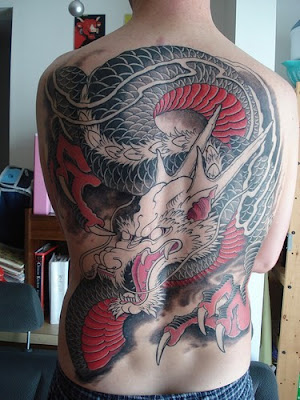 Japanese dragons are a combination of Indian, Chinese and Korean myths and legends, both in their appearance and their significance. They are primarily understood as manifestations of water gods, whether the water is rain, a river, or the sea. Japanese dragons are different than European dragons mostly due to their lack of wings, though they share the same long, snakelike bodies of the dragons from European lore.
Japanese dragons are a combination of Indian, Chinese and Korean myths and legends, both in their appearance and their significance. They are primarily understood as manifestations of water gods, whether the water is rain, a river, or the sea. Japanese dragons are different than European dragons mostly due to their lack of wings, though they share the same long, snakelike bodies of the dragons from European lore.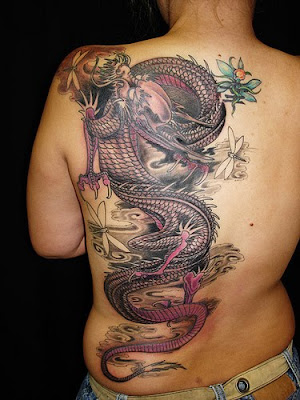 You can tell whether a dragon is Japanese, Chinese or Korean by how many toes it has on its feet. Chinese dragons have five toes, whereas Korean ones have four toes and Japanese dragons have only three toes. In Chinese mythology dragons represent wisdom and power. There are nine kinds of Chinese dragons, and each has a domain or a characteristic assigned to it -- there are celestial, spiritual, earth, underworld, horned, winged, coiling and yellow dragons, and the king.
You can tell whether a dragon is Japanese, Chinese or Korean by how many toes it has on its feet. Chinese dragons have five toes, whereas Korean ones have four toes and Japanese dragons have only three toes. In Chinese mythology dragons represent wisdom and power. There are nine kinds of Chinese dragons, and each has a domain or a characteristic assigned to it -- there are celestial, spiritual, earth, underworld, horned, winged, coiling and yellow dragons, and the king.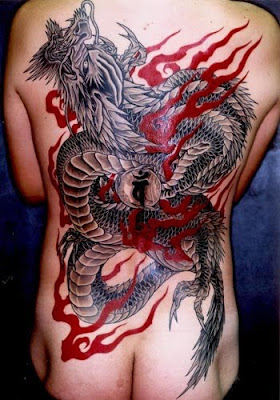 Japanese dragons mean different things to different people, and tattoo culture in the modern United States seems to be morphing away from what dragons represented in traditional Japanese texts, like the Kojiki and Nihongi that were written all the way back in 7th and 8th century Japan and earlier. For instance, in modern tattoo parlors, the dragon Ryu is a Buddhist image of faith, and is considered an immortal.
Japanese dragons mean different things to different people, and tattoo culture in the modern United States seems to be morphing away from what dragons represented in traditional Japanese texts, like the Kojiki and Nihongi that were written all the way back in 7th and 8th century Japan and earlier. For instance, in modern tattoo parlors, the dragon Ryu is a Buddhist image of faith, and is considered an immortal.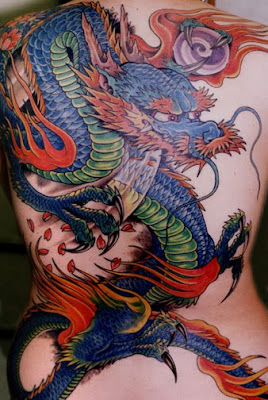 There is a dragon god Ryujin, also called Watatsumi in ancient Japanese myths, but he was not so much an embodiment of faith so much as the ruler of the oceans. He was also able to change into human form when he chose to, and there are no references in modern tattoo lore or meanings or artist's renderings of these creatures becoming human.
There is a dragon god Ryujin, also called Watatsumi in ancient Japanese myths, but he was not so much an embodiment of faith so much as the ruler of the oceans. He was also able to change into human form when he chose to, and there are no references in modern tattoo lore or meanings or artist's renderings of these creatures becoming human.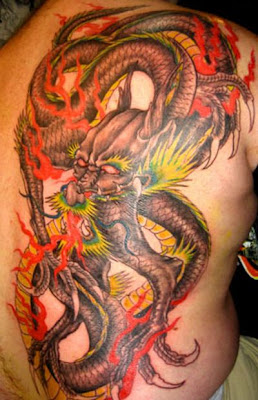 Dragon colors are very important for the meaning of a tattoo. Dragons in this tradition come in black, red, white, blue and yellow. The colors are tied to one of the four directions (North, South, East and West), and to the behaviors of the dragon. Black dragons represent the North, for example, and create storms when they fight. Red dragons also create storms when they fight, but they represent the West. Blue dragons hail from the East and are a manifestation of the season Spring. White dragons belong to the South, and represent mourning, death or famine and the eastern dragon god O Goncho. Yellow dragons are actually meant to be gold dragons and represent the dragon Kinryu. They are linked to no particular direction and are almost always invisible, until the single perfect moment, in which they briefly show themselves.
Dragon colors are very important for the meaning of a tattoo. Dragons in this tradition come in black, red, white, blue and yellow. The colors are tied to one of the four directions (North, South, East and West), and to the behaviors of the dragon. Black dragons represent the North, for example, and create storms when they fight. Red dragons also create storms when they fight, but they represent the West. Blue dragons hail from the East and are a manifestation of the season Spring. White dragons belong to the South, and represent mourning, death or famine and the eastern dragon god O Goncho. Yellow dragons are actually meant to be gold dragons and represent the dragon Kinryu. They are linked to no particular direction and are almost always invisible, until the single perfect moment, in which they briefly show themselves.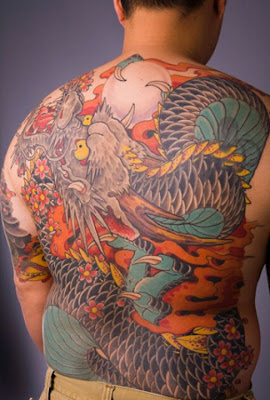 There are also a number of names and qualities embodied with different dragon tattoos now. For example, the dragon Fuku Riu is for good luck. He is usually shown flying up and is supposed to be in a pose of liveliness and strength. According to our dragon lore, any dragon flying into the sky mean ascension or success.
There are also a number of names and qualities embodied with different dragon tattoos now. For example, the dragon Fuku Riu is for good luck. He is usually shown flying up and is supposed to be in a pose of liveliness and strength. According to our dragon lore, any dragon flying into the sky mean ascension or success.Labels: Animal Tattoos, Dragon Tattoos, Japanese Tattoos
Subscribe to:
Post Comments (Atom)
0 comments:
Post a Comment